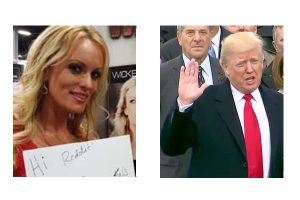Stormy-Payment Claim Only Raises More Questions
 NEW YORK – The statement released by Donald Trump’s longtime lawyer Michael Cohen explaining (and for the first time, admitting to) a payment made to Stormy Daniels raises far more questions than it answers.
NEW YORK – The statement released by Donald Trump’s longtime lawyer Michael Cohen explaining (and for the first time, admitting to) a payment made to Stormy Daniels raises far more questions than it answers.
One of those questions: Why is so much of the reporting on Cohen’s statement so sloppy and imprecise?
Headlines abound which use some version of the claim that Cohen says he paid Stormy “out of his own pocket,” but Cohen’s statement doesn’t say such.
As noted by law professor/attorney/blogger Orin Kerr, what Cohen’s statement says is he “facilitated” a payment to Daniels, which isn’t the same thing as saying he paid Daniels with his own money.
“I would think that the most literal reading of Cohen’s statement is just that he used his own funds to arrange the payment,” Kerr wrote in a post published Wednesday. “He’s not making any statement about whose $130,000 was paid. For example, if it took Cohen a few hundred dollars to set up an entity to pay Daniels, and to wire someone else’s $130,000 to her, then he would have been using his own personal funds to facilitate that payment.”
Of course, as Kerr also observed, Cohen’s statement has “enough ambiguities in it to drive a truck through,” and leaves open the possibility he was reimbursed by Trump himself, even as it denies Cohen was paid back by Trump’s company or political campaign.
“Maybe Trump just wrote a personal check to Cohen,” Kerr continued. “Cohen was reimbursed, but not from Trump’s ‘organization’ or ‘campaign.’ At this point, we don’t know. And of course we also don’t know if what Cohen is now saying is literally true. Cohen’s ‘reputation for having a character for truthfulness,’ to use an evidence law phrase, is lousy.”
Regardless of whose money was used, the way the payment was conducted raises other questions, potentially including substantial professional ethics issues.
In a tweet posted Wednesday morning, attorney Karen Tynan raised the possibility Cohen’s actions in making the payment may have violated New York state’s rules of professional conduct for attorneys.
NY Attorney General should subpoena the bank records for the attorney bank account. #taxevasion #moneylaundering
Under the N.Y. professional rules for attorneys, Cohen is required to maintain banking records for all payments. https://t.co/F5g1ZKgH8z— Karen Tynan (@KarenAttorney) February 14, 2018
Asked by YNOT whether it would be legally or ethically problematic if Cohen paid Daniels out of an existing legal defense fund previously established by Trump, for example, Tynan said even if that is the case, “Attorneys don’t typically set up shell corporations to pay settlement funds.”
“It seems questionable to me,” Tynan added. “Paying the money without issuing a 1099 does seem to be tax evasion. Attorney Cohen wanted to transfer money that is classified as compensation.”
Tynan also echoed Kerr in noting that the highly ambiguous and detail-free nature of Cohen’s statement raises all sorts of other pertinent questions.
“Was the $130K all to Stormy?” Tynan said. “Was some part to her attorney? Was it one check? Did the settlement agreement categorize the proceeds in a particular way? Who were the parties? Was it Donald Trump and Stormy?”
The reported response to Cohen’s statement from Daniel’s manager, Gina Rodriguez, raises some questions of its own.
“Everything is off now, and Stormy is going to tell her story,” Rodriguez told the Associated Press.
Whether Daniels is truly freed from the non-disclosure agreement she reportedly signed is questionable, and dependent on the precise terms of the NDA in question – terms which are currently unknown, and may remain so.
“With regard to the NDA, all of us attorneys have preferred ‘confidentiality clauses,’” Tynan told YNOT. “Some require confidentiality of the settlement amount, some requirement confidentiality regarding the fact that there is a settlement, some require confidentiality of the underlying facts. Based on all the press comments, comments, from Stormy, etc., it seems that the confidentiality clause was very broad and included the underlying facts. We may never know.”
Depending on the terms of the NDA Daniels signed, telling her story may come with a hefty price, Tynan observed.
“When a party breaches the confidentiality clause, there are usually liquidated damages,” Tynan said. “For example, you agree that since it’s difficult to prove what the value of the breach of confidentiality damages, you agree that the damages are $10,000 per occurrence or $25,000 per occurrence for example. It’s meant to be an incentive to keep your mouth shut.”
Typically, a breach of the agreement by one party (or in Cohen’s case, possibly an intermediary who may not be a party to the agreement at all) does not automatically release other parties to the agreement from their obligations.
“Just because one party breaches confidentiality doesn’t mean the other party can then breach, at least not generally,” Tynan said. “I think Stormy is still bound by the confidentiality clauses with the monetary punishments.”
Regardless of those details, Tynan said “this whole argument that the attorney paid her personally stinks.”
“No attorney pays settlements from their own money,” Tynan said. “How can he negotiate a settlement agreement and then be the person bound to pay the money? Isn’t that a conflict of interest if he’s advising Trump but he’s paying the money? His incentives could be counter to his client.”
As Tynan noted, we may never know the details of the agreement Daniels signed. It’s also possible no significant legal, ethical or professional trouble will come to Cohen, Trump or Daniels from their unusual arrangement and payment, in part because prosecutors have had little luck with similar cases involving alleged hush money paid on the behalf of political candidates in the past.
Another pair of questions comes to mind concerning Cohen’s statement: Why did he issue the statement publicly, and assuming doing so was designed to help resolve the controversy surrounding Trump’s alleged affair with Daniels, or dispel concerns about the payment made to her, has Cohen’s handling of the situation helped matters?
CNN posed essentially the same questions to Rick Hasen, a law professor from the University of California, Irvine.
“I think he probably thought this was the best way to handle it,” Hasen said, adding it was “not clear” to him that it was.













